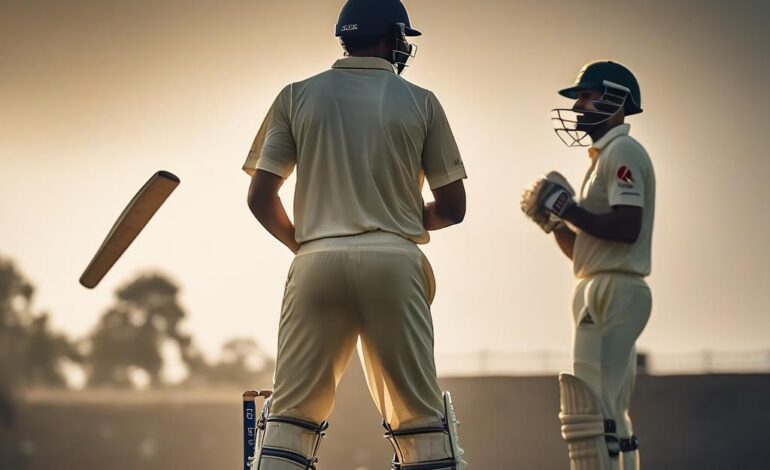How to Become a Cricketer

-
Table of Contents
- How to Become a Cricketer
- 1. Start Early and Develop Basic Skills
- 2. Get Proper Coaching and Training
- 3. Play Regularly and Gain Match Experience
- 4. Stay Physically Fit and Work on Strength Training
- 5. Network and Seek Opportunities
- 6. Stay Updated and Learn from the Best
- 7. Be Patient and Persevere
- Summary
- Q&A
- 1. What age should I start playing cricket?
- 2. How can I improve my batting technique?
- 3. What are some common bowling techniques in cricket?
- 4. How can I catch the attention of selectors?
Cricket is a popular sport played and enjoyed by millions of people around the world. It requires skill, dedication, and a deep understanding of the game. If you have a passion for cricket and dream of becoming a cricketer, this article will provide you with valuable insights and guidance on how to pursue your goal. From developing your skills to finding opportunities to play, we will cover all the essential steps to help you on your journey to becoming a cricketer.
1. Start Early and Develop Basic Skills
Like any other sport, starting early is crucial in cricket. The earlier you begin, the more time you have to develop your skills and gain experience. Here are some basic skills you should focus on:
- Batting: Practice your batting technique, footwork, and shot selection. Work on your hand-eye coordination and timing.
- Bowling: Learn different bowling techniques such as fast bowling, spin bowling, and swing bowling. Practice your accuracy and variations.
- Fielding: Improve your catching, throwing, and agility. Work on your reflexes and anticipation.
Join a local cricket club or academy that offers coaching and training facilities. This will provide you with the necessary guidance and resources to develop your skills effectively.
2. Get Proper Coaching and Training
While practicing on your own can be beneficial, getting proper coaching and training is essential to refine your skills and learn the nuances of the game. Look for experienced coaches who can provide personalized guidance and help you improve your technique.
Coaches can help you identify your strengths and weaknesses, suggest drills and exercises to enhance your skills, and provide valuable feedback to help you progress. They can also teach you the tactical aspects of the game, such as reading the opposition, setting fielding positions, and making strategic decisions.
3. Play Regularly and Gain Match Experience
Playing matches regularly is crucial to gain practical experience and apply your skills in a competitive environment. Look for opportunities to participate in local tournaments, school matches, and club games. This will not only help you improve your game but also expose you to different playing conditions and situations.
Playing matches will teach you how to handle pressure, make quick decisions, and adapt to different game scenarios. It will also provide you with the opportunity to showcase your talent and catch the attention of selectors and scouts.
4. Stay Physically Fit and Work on Strength Training
Cricket is a physically demanding sport that requires strength, endurance, and agility. To excel in the game, it is essential to stay physically fit and work on your strength training. Here are some key aspects to focus on:
- Cardiovascular Fitness: Engage in activities such as running, swimming, or cycling to improve your stamina and endurance.
- Strength Training: Include exercises like weightlifting, push-ups, squats, and lunges to build strength in your muscles.
- Flexibility: Incorporate stretching exercises and yoga to improve your flexibility and prevent injuries.
A well-rounded fitness routine will not only enhance your performance on the field but also reduce the risk of injuries and improve your overall health.
5. Network and Seek Opportunities
Networking plays a crucial role in any profession, and cricket is no exception. Build connections with fellow cricketers, coaches, and professionals in the cricketing industry. Attend cricket camps, workshops, and events to meet people who can help you in your journey.
Seek opportunities to showcase your skills and gain exposure. Participate in trials conducted by local cricket associations, state teams, or national academies. Keep an eye on talent hunts and talent identification programs organized by cricket boards and franchises.
6. Stay Updated and Learn from the Best
Stay updated with the latest happenings in the cricketing world. Watch international matches, follow domestic tournaments, and analyze the performances of top cricketers. Learn from their techniques, strategies, and mindset.
Study the game by reading books, watching documentaries, and listening to podcasts by renowned cricketers and experts. Gain insights into the mental aspects of the game, such as handling pressure, maintaining focus, and building resilience.
7. Be Patient and Persevere
Becoming a cricketer is not an overnight process. It requires years of hard work, dedication, and perseverance. There will be ups and downs, successes and failures, but it is important to stay patient and keep pushing forward.
Believe in your abilities, learn from your mistakes, and never give up on your dreams. Keep working on your skills, stay disciplined, and maintain a positive attitude. With time and consistent effort, you can achieve your goal of becoming a cricketer.
Summary
Becoming a cricketer requires passion, dedication, and a systematic approach. Start early, develop your basic skills, and get proper coaching and training. Play matches regularly to gain experience and exposure. Stay physically fit and work on your strength training. Network, seek opportunities, and learn from the best. Above all, be patient and persevere in your journey. With the right mindset and consistent effort, you can turn your dream of becoming a cricketer into a reality.
Q&A
1. What age should I start playing cricket?
It is recommended to start playing cricket at a young age, around 6-8 years old. However, it is never too late to begin. Many successful cricketers have started playing the sport in their teenage years or even later.
2. How can I improve my batting technique?
To improve your batting technique, focus on your footwork, shot selection, and timing. Practice regularly, work on your hand-eye coordination, and seek guidance from experienced coaches. Analyze the techniques of top batsmen and learn from their approach.
3. What are some common bowling techniques in cricket?
Some common bowling techniques in cricket include fast bowling, spin bowling, swing bowling, and seam bowling. Each technique requires specific skills and practice. Work on your accuracy, variations, and control to become a proficient bowler.
4. How can I catch the attention of selectors?
To catch the attention of selectors, perform consistently in matches and tournaments. Score runs, take wickets, and showcase your skills. Participate in trials and talent identification programs organized by cricket associations and franchises. Network with coaches and professionals in the cricketing industry.



